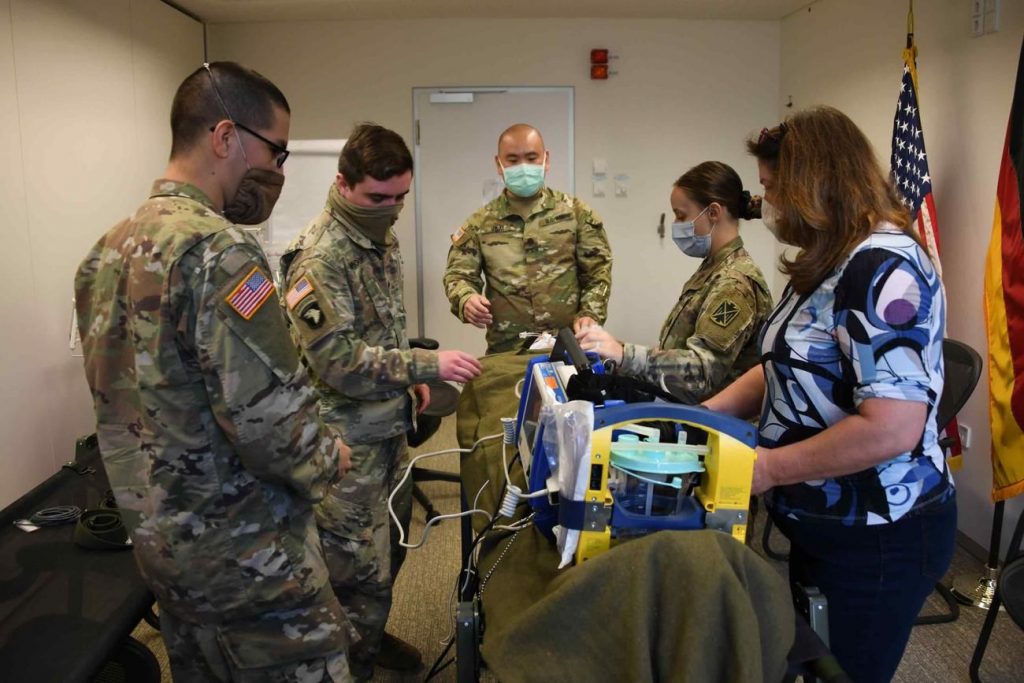House Lawmakers Want to Pause Military Health System Overhaul
4 min read
A bipartisan House Armed Services panel is seeking to delay several Defense Department health system reforms until the Pentagon provides Congress with updates on its medical staffing needs and plans to shift retirees and families to the Tricare health program.
The House Armed Services personnel subcommittee on Monday unveiled its portion of the fiscal 2021 defense policy bill, proposing legislation that includes several measures to secure health care services for U.S. service members, their families and retirees.
Under the House proposal, the military services would not be allowed to trim their medical staff for up to a year after the bill becomes law — an effort to ensure that the DoD is adequately staffed to handle its current patient load, as well as respond to national emergencies like the COVID-19 pandemic.
The draft legislation also would require the DoD to delay plans to shift military retirees, their dependents and some active-duty family members from military hospitals and clinics to civilian providers in Tricare.
Congressional aides, who spoke on the condition of anonymity because they were not authorized to speak for the committee, said that the services have not done a thorough analysis of their medical staffing needs since the COVID-19 pandemic began and they don’t “know what their operational requirements are.”
“We want the department to take a hard look at their support for pandemic influenza and the homeland defense mission and make sure they have the right medical force structure in place,” a committee aide said.
As the novel coronavirus pandemic exploded in late March and April, the DoD deployed more than 4,000 medical personnel to hard-hit communities across the country. Reservists were called up, and the services offered retirees with medical experience an opportunity to return to duty to participate in the response.
Anticipating another national emergency or pandemic, the subcommittee, chaired by Rep. Jackie Speier, a California Democrat, included a provision in its proposed legislation that would allow the services to recall more than 1,000 retirees to active duty if needed.
Committee aides said members, however, still want a clearer picture of the current military medical force structure.
“We never received the breakdown we asked for. … The numbers keep changing, and we don’t have the analysis behind it,” the aide said.
Under requirements of the fiscal 2017 National Defense Authorization Act, the Defense Department is in the middle of reorganizing its health system, shifting management and oversight of military treatment facilities and other health-related agencies to the Defense Health Agency and focusing the services’ medical commands on training and serving uniformed personnel.
Supporters say the effort, which will shift more DoD beneficiaries to civilian providers, will improve readiness and health care for more than 9 million patients.
But advocates have raised concerns that communities near military health facilities targeted for downsizing lack the capacity to care for an influx of Tricare patients. The Government Accountability Office said in May that the DoD’s assessments of the availability of health care in communities are built on incomplete or faulty data that could leave beneficiaries without access to a doctor.
Citing the GAO report, aides said committee members are “not confident in DoD’s analysis” of its health care networks, which is why they are seeking a delay.
“Even before the GAO report came out, there was great concern over the rigor of the analysis that has gone on,” a staff member said.
The subcommittee is expected to pass its portion of the National Defense Authorization Act on Tuesday, and the House Armed Services Committee will take it up next week. The legislative actions are among the early steps in a long path toward becoming law, however: The bill must pass the House and then be reconciled with the Senate’s version before it has a chance to become law.
The Senate’s proposed fiscal 2021 defense policy bill contains no similar restrictions on military health system reforms.
Other health provisions in the House panel’s proposal include requirements that the Pentagon:
-
Contract with the National Academies of Sciences, Engineering and Medicine to study cancer diagnoses and deaths among military pilots;
-
Include in its annual report on military suicides data on whether any deaths occurred within a year of a deployment or within a year of receiving medication for a mental health diagnosis;
-
A delay in the transfer of the services’ medical research agencies and institutes to the Defense Health Agency for at least three years.
-
Army Secretary Ryan McCarthy asked Pentagon leadership in December that the service be allowed to keep its public health and research commands rather than transfer them to DHA as required by the health system restructuring.
By Patricia Kime





